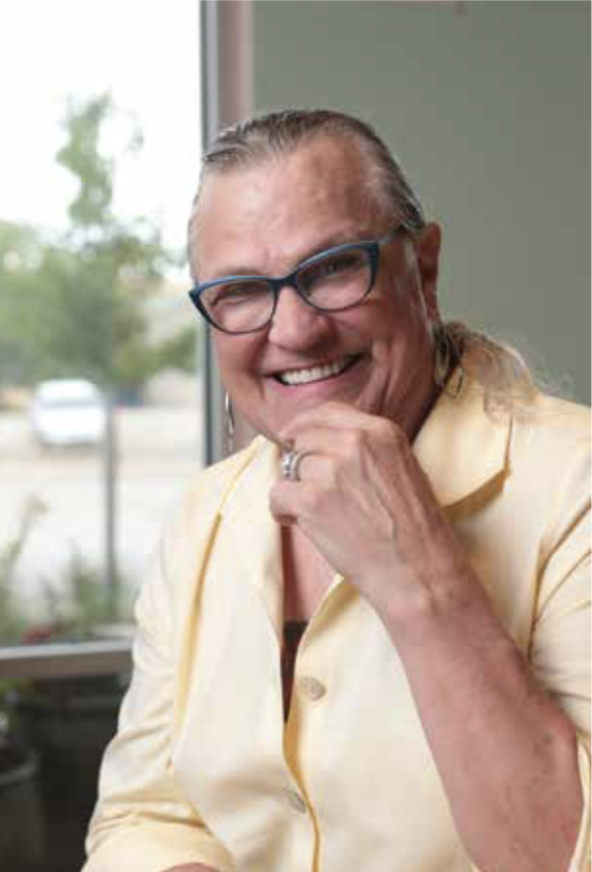For the first time in my life, I felt normal, like I was in the right body
Vanessa Tennyson lives in Minneapolis, Minnesota, with her wife of four years. The couple has been together for 14 years. Tennyson was previously married for 25 years and has two adult children and a grandchild. She is becoming certified as an executive and leadership coach — an “encore career” — after running the business operations of an engineering firm for 32 years.
In February 2018 Tennyson had gender-affirmation surgery at Mayo Clinic in Rochester, concluding a process that began a decade earlier. She came out as transgender to her children, family and friends in 2014.
Her daughter’s response was, “I love you. I’ve never seen you smile before.”
Tennyson says it was a long time to go without knowing who she was. She first felt different at age
5 — a feeling that intensified in junior high. She kept busy with hockey, cross-country, track, choir and the National Honor Society in high school to try to distract from that feeling but says depression at 16 caused her to consider throwing herself in front of a bus.
Tennyson graduated from the Carlson School of Management at the University of Minnesota, where she began to understand her differences. She identified with some of the descriptions in an abnormal psychology class at the university.
“I felt like I had a disease,” she says. “I felt alone, misunderstood, like a freak. I didn’t know who I was.”
After years of hiding her feelings about her identity, Tennyson found an LGBTQ-friendly clinic in the Twin Cities. With guidance from her psychologist, Tennyson began the process of completing the World Professional Association for Transgender Health (WPATH) standards of care for the purpose of gender-affirmation surgery in 2014. She planned to see a physician in Chicago to explore surgery until she read about Mayo Clinic’s Transgender and Intersex Specialty Care Clinic (TISCC) in a newspaper. Her first visit was in 2017.
“I chose Mayo Clinic for its world-renowned medical expertise and because patients could complete the entire process in one medical system,” says Tennyson. “None of the other gender-affirmation surgery programs I researched offered a clinic, behavioral care and hospital care team all in one. I could coordinate my care without the complication of multiple medical organizations.”
Tennyson describes the eight-month process from her first visit at Mayo Clinic until she had surgery as thorough and compassionate. “The Mayo team didn’t treat me like I had an affliction that needed fixing. They treated me like someone who needed to be made normal so I could get on with who I’ve always been. Careful consideration was evident in every step of decision-making.
“The experience was very patient-centric. The patient drives the model, engaging the medical team as they guide you through their specialties. The process is collaborative, and the communication is refreshing, empowering and personal.”
The last day of February 2018 was Tennyson’s last day in a man’s body.
“For the first time in my life, I felt normal, like I was in the right body,” she says about herself after surgery, performed by Oscar Manrique, M.D., Division of Plastic and Reconstructive Surgery. “The Mayo team didn’t treat me like I had an affliction that needed fixing. They treated me like someone who needed to be made normal so I could get on with who I’ve always been. Before surgery, I felt confused, shameful and embarrassed. I was never truly happy. When I came out as transgender and began dressing as a woman, I felt better but not yet whole. When I look in the mirror now, I only see a woman. I feel happy and settled.” — Vanessa Tennyson
 Tennyson spent seven days in the hospital and returned to work six weeks after surgery and soon thereafter began physical therapy to exercise her pelvic floor. She serves on the TISCC Patient and Family Advisory Council, which was formed to solicit input about how to make the program run more smoothly and determine useful educational materials.
Tennyson spent seven days in the hospital and returned to work six weeks after surgery and soon thereafter began physical therapy to exercise her pelvic floor. She serves on the TISCC Patient and Family Advisory Council, which was formed to solicit input about how to make the program run more smoothly and determine useful educational materials.
“I’m filled with profound gratitude to the Mayo Clinic staff involved in my care,” she says. “It’s extremely rare that one health care system contains so many professionals of extraordinary talent and enthusiastic, empathetic demeanor. From my very first phone inquiry to postsurgical care, I experienced nothing but respect and kindness. I could not have scripted a better health care team. They are a precious commodity in the ever-changing and complex world of health care.”